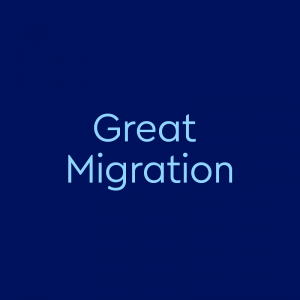Historical & Current Events dictionary
Great Migration
[ greyt mahy-grey-shuhn ]
What does Great Migration mean?
The Great Migration was a migration of approximately six million African Americans from the US South to cities and other areas in the North, West, and Midwest from roughly 1910 to 1970. These population shifts shaped the longstanding demographics of many areas of the US.
Historians typically divide the Great Migration into two major phases: one large wave of migration between 1910 and 1940 and another lasting until around 1970.
The large-scale relocation is often attributed to several different factors, notably the desire of Black Southerners to escape the Jim Crow laws that were widespread throughout the South along with other pervasive forms racism and discrimination; and the greater availability of jobs and educational opportunities in Northern urban areas, particularly around the time of each World War.
The migration resulted in significant Black population increases in many Northern cities and the formation of Black communities there. These communities are often considered to be the basis of Black urban culture and the growth of Black arts movements, such as the Harlem Renaissance.
Though the North did not have the widespread Jim Crow laws of the South, Black people were nonetheless targeted by Northern whites with racist policies and discrimination, such as redlining and de facto segregation. The legacy and persistence of such policies continue to affect Black communities.
Though Black populations in the South declined overall during the period of the Great Migration, many Black Southerners stayed in the South or moved to urban areas within the South during the era.
More recently, the term Great Migration has been used in discussions of similar relocation trends and demographic shifts in the 2000s (beginning perhaps as early as the late 1990s) involving Black Americans moving from Northern and Western states to Southern states, especially Southern cities. This movement has been called the “new Great Migration” in some reports about it.
Other meanings
The term Great Migration is also used in another completely different way to refer to the yearly migration of many migratory animals in East Africa, including millions of wildebeest.
Where does Great Migration come from?

Records show that the term Great Migration, in the sense of the 20th century demographic shift in the US, has been used since at least the 1960s, when it was still in progress. The term became more commonly used by historians and others in the 1970s and 1980s after the shift had largely ended.
In Great Migration, the word great is used in the sense of “large” or “significant,” a sense that’s also used in the names of other important historical events, such as the Great Depression.
Examples of Great Migration
Who uses Great Migration?
The historical event known as the Great Migration is often discussed in the context of US history and the legacy of its long-term results, including demographic shifts and the formation of Black communities and urban culture.
I saw the long, long line at a polling place in Mississippi and thought that if my grandparents hadn't come up north, I might be right there in line with them. We descendants of the Great Migration should not forget our roots or get smug at times like this.
— Tiffany Gholar (@tiffanygholar) November 4, 2020
Imani Perry on her book South to America and the Great Migration. "We have an answer to why people left, but not why did people stay. …What did it mean to stay and fight?" https://t.co/5ceGO537MA
— paperhaus (@paperhaus) January 23, 2022
It’s time for another great migration. Some of these places don’t deserve us.
— Church Socks (@KarlousM) June 24, 2020
Sometimes, the term is used in the discussion of more recent relocation trends, including what’s sometimes called the “new Great Migration.”
African Americans are moving out of the cities that their parents and grandparents fled to during Jim Crow and into the South‘s booming metropolises.
Some are calling it the new Great Migration. https://t.co/W6qjOvUhHP
— The Washington Post (@washingtonpost) January 19, 2022
Why are Black people moving away from America’s Northern cities? @keneshiagrant on the causes and consequences of a new Great Migration: https://t.co/1N0mmk3e3c #America
— The Signal (@thesignal) January 23, 2022
Unrelatedly, the term Great Migration is also popularly used to refer to the annual migration of wildlife in East Africa.
Every year, millions of wildebeests migrate from Kenya across Masai Mara into Tanzania through the Serengeti and to the Ngorongoro Crater, in search of grass and water.
This phenomenon is known as the GREAT MIGRATION and is one of the 7 natural wonders of Africa. pic.twitter.com/yvjv0SMU8f
— Yvonne Maphosa (@Yvonne_Maphosa) July 17, 2021
Note
This is not meant to be a formal definition of Great Migration like most terms we define on Dictionary.com, but is rather an informal word summary that hopefully touches upon the key aspects of the meaning and usage of Great Migration that will help our users expand their word mastery.